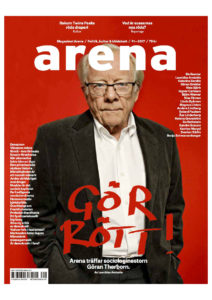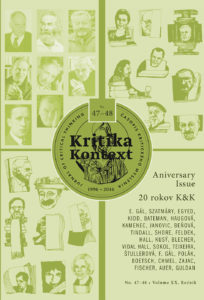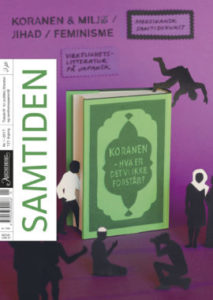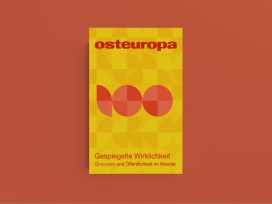A hesitant European is a defeated European
- Eurozine Review
2/2017
‘Blätter’ calls for a courageous politics for Europe; ‘Arena’ talks to Göran Therborn about equality and populism; ‘Kritika & Kontext’ gathers old friends; ‘Samtiden’ discovers the feminist Qur’an; ‘Prostory’ assesses the protests in Belarus; ‘pARTisan’ revisits the collective farm; ‘New Literary Observer’ discusses mastery and slavery; and ‘Osteuropa’ reads Platonov.
Blätter für deutsche und internationale Politik (Germany) 4/2017
Blätter publishes a conversation between Emmanuel Macron and Sigmar Gabriel, introduced by Jürgen Habermas, entitled ‘Thinking Europe anew’. Habermas defines the problem: ‘The governments of the Member States, which must derive their legitimacy from their respective national publics, are the least suited to implementing community interests; and yet, as long as we lack a European party system, they are the only actors who can achieve anything at all.’ Are appeals to European solidarity ‘condemned to failure’ or do politicians ‘simply lack the courage to address the burning topic of the future of Europe’?
According to Macron, ‘If you are a hesitant European, you are already a defeated European, so I don’t recommend this option. Because today it is Europe that protects us from new risks.’ Reformers, he argues, need to start talking about social justice at the European level in order to stand a chance against the ‘populists and extremists’. Gabriel takes a similar line. Refuting the standard German image of itself as ‘net contributor’ to the EU, he argues that ‘only with the provocation “We are ready to pay more!” do you get a debate on why all of us in Europe actually ought to share a common interest.’
Public sphere debate: Is the goal of European public sphere best served by the creation of a supranational public service broadcaster, as has recently been proposed? Roman Léandre Schmidt and Carl Henrik Fredriksson are sceptical: rather than creating an artificial flagship, the EU must provide incentives for existing outlets to Europeanize their operations, they argue. However, Europe must first ‘overcome its fear of independent European journalism’. ‘It is precisely in those countries where independent work is only possible in the face of huge difficulties that there is no option other than to support local initiatives and facilitate their involvement in European networks.’
More articles from Blätter in Eurozine; Blätter’s website
Arena (Sweden) 1/2017
Arena features a ten-page interview with one of the world’s most renowned Marxist sociologists, the seventy-five year-old Swede Göran Therborn. Professor emeritus at Cambridge University, Therborn’s analyses of the ailments of capitalism continue to appear regularly, most recently The Killing Fields of Inequality in 2013 (see his article of the same name published in Soundings and Eurozine). In his next book, Cities of Power (forthcoming in May), he ‘questions received assumptions about the source of urban power and how it manifests itself’.
Inequality has always been at the heart of much of Therborn’s work. ‘We have a major problem of integration’, he tells interviewer Leonidas Aretakis. But he is not talking about immigrants. ‘The upper class lives as if on a different planet. One of the questions of the future will be how we can integrate them again.’
Turning to the current political landscape, Therborn argues that ‘progressive’ people’s contempt for populism is a mistake. ‘Contrary to what they say, populism is not at all a kind of proto-fascism, but instead has roots in nineteenth-century America and Russia.’ Sweden, he concludes, ‘needs a leftwing populist like Bernie Sanders’. One gets the feeling that he is talking about elsewhere too.
Announcement: Last week, Håkan Bengtsson, who together with Per Wirtén founded Arena twenty-four years ago, announced that the magazine is being wound down. The publication has been losing money for years and is no longer sustainable. However, he assures readers that the type of content published in Arena will find its way into some of the magazine’s spin-offs, such as the politics and opinion webzine Dagens Arena.
More articles from Arena in Eurozine; Arena’s website
Kritika & Kontext (Slovakia) 47-8 + 49 (2017)
Kritika & Kontext is one of the few Slovakian cultural journals founded after 1989 still publishing. To celebrate its twentieth anniversary, friends write on a literary or theoretical work that has impacted on their thinking. Their contributions cover two entire issues.
Kundera: Kritika editor Samuel Abrahám chooses the last section of Milan Kundera’s essay Testaments Betrayed (1993), a reflection on the value of privacy and the morality of posthumous publication. Recalling the scandal around the publication of Kundera’s Stasi files in 2008, Abrahám, writes: ‘He is not hiding; he protects his privacy on principle because he does not want to expose and display it publicly. Everything that Kundera wishes to say in public is contained in his oeuvre.’
Taylor: Klaus Nellen selects an essay by Charles Taylor written in 1991 for Transit and published here in English for the first time. In it, Taylor asks what exactly ‘is the nature of the relations in which people stand when they are common citizens of a democratic regime?’ Neither the ‘economic theory of democracy’ nor the Rousseauian volonté générale provides a satisfactory answer. Instead, there is a middle way in which the constitution ‘is seen and cherished as a common good, because it is seen as the common repository and bulwark of the dignity of all the participants’.
Taylor illustrates this idea with the reaction of US society to the Watergate scandal, ‘where the sense was so strong that a violation of trust and an abuse of power of this kind could not be tolerated, that the President was forced out of office. Here we have a classic case of the operation of the common belief that the laws are a common repository of the dignity of the citizens, and that their violation cannot be tolerated. The world can be grateful that this reflex is still strong in the American public.’
Also: Other contributors include Iveta Radičová, who introduces Anthony Giddens’s text ‘Democracy’ with the warning that ‘figuratively speaking, the four basic pillars of liberal democracy are taken for granted, or even worse, in the mouths of extremists, nationalists, autocrats, and authoritarian politicians, depicted as dangers to the creation of a feeling of security’. And Stefan Auer writes on Leszek Kołakowski’s 2003 essay ‘Can Europe happen?’, where the Polish philosopher balances his Euroscepticism with the observation that ‘it is by no means obvious that only a nation can be a sovereign subject. Part of a nation, or a group of nations, can equally well be sovereign.’
More articles from Kritika & Kontext in Eurozine; Kritika & Kontext ‘s website
Samtiden (Norway) 1/2017
The first issue of Samtiden under the editorship of Christian Kjelstrup is on the Qur’an. Insecurity and ignorance characterize most Norwegians’ relation to one of the most important books in world history, Kjelstrup notes in his editorial. The aim of the issue is to find ‘a new way in to the eternal, polarized and deadlocked “Islam debate”’.
The Qur’an and feminism: Marianne Bøe, a historian of religion, discusses feminist readings of the Qur’an, from Nazira Zeineddine’s pioneer work on the veil from 1928 to Amina Wadud’s ‘gender jihad’ (2006). Most of these interpretations have attracted massive criticism from within Islam, not only from conservatives but also from radicals who claim that feminist Muslims are promoting an academic emancipatory project relevant only for a small western elite.
‘And yet,’ notes Bøe, ‘feminist readings of the Qur’an have turned out to be both useful and important, since they inspire broader feminist activism founded in Islam. Thus, the Malaysian-based feminist group Sisters in Islam uses Amina Wadud’s book Qur’an and Woman in their work against polygamy, which is currently practiced and promoted in numerous places around the world with explicit reference to Islam. In Morocco in 2004, local activists making use of feminist language based in Islam managed to influence the government to revise the country’s “family law” in the direction of gender equality.’
These and other examples ‘show that a feminist reading of the Qur’an is not only possible, but also relevant to all those big and small struggles for gender equality that are being fought in many different contexts. These feminist readings challenge the monopoly of a conservative Muslim clergy on interpretations of the Qur’an and make it possible to think differently about a religion that today is mostly regarded as suppressing women throughout the world.’
Also: Selene Wendt on the Qur’an and contemporary art; Shoaib Sultan on the Qur’an and climate change; and Warsan Ismail on whether the Qur’an and science are compatible.
More articles from Samtiden in Eurozine; Samtiden’s website
Prostory (Ukraine)
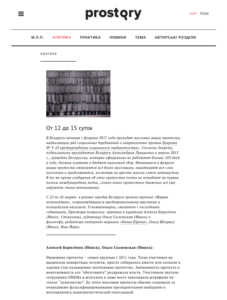 In Prostory, Belarusian intellectuals assess the latest protests in Belarus, sparked by a decree to prevent ‘social dependency’ that would have forced the unemployed to pay a special tax. The regime has resorted to mass arrests and shows of force with protesters being summarily sentenced for up to fifteen days for ‘disorderly conduct’.
In Prostory, Belarusian intellectuals assess the latest protests in Belarus, sparked by a decree to prevent ‘social dependency’ that would have forced the unemployed to pay a special tax. The regime has resorted to mass arrests and shows of force with protesters being summarily sentenced for up to fifteen days for ‘disorderly conduct’.
Critic and curator Alexey Borisyonok and artist Olga Sosnovskaya compare the protests with those in 2011 following the fraudulent presidential election. Like six years ago, they are not controlled by the nationalist opposition, but are an expression of widespread popular discontent. The spontaneous solidarity among the protesters can be seen as a germ of democracy emerging from below. However, the spontaneity of the protests is also a weakness: they lack internal organization and people’s attitudes remain vague.
According to Olga Shparaga, editor of the internet journal Novaya Evropa, the protests are indeed different this time, insofar as they are explicitly about the economy. Faced with huge problems, the regime places the burden of responsibility on the shoulders of citizens. Yet citizens have no say in decision-making processes, which inevitably causes cynicism and apathy. The creative solidarity emerging among people ‘helps society take a look at itself and see that, unlike the regime, it might still have some kind of future’.
Also: An insight into the work of the young Russian artist Alisa Yoffe, whose monochromatic paintings are inspired by various manifestations of hatred and tyranny. She says that she especially wants her harrowing canvases to be seen by children, because ‘they still have some future’.
More articles from Prostory in Eurozine; Prostory’s website
pARTisan (Belarus) 32/2016
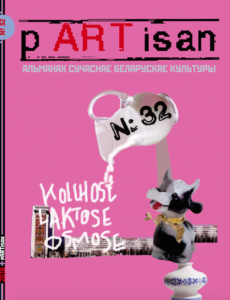 The latest issue of pARTisan looks at the Kolkhoz phenomenon and the myth of state-run agriculture from a variety of artistic, historical, social scientific and visual perspectives. ‘The Olympian ascent of the Great Kolkhoz began in the late 1920s,’ writes editor and author Artur Klinau in his opening essay, ‘when at the XV Bolshevik Congress the resolution was taken on the collectivization of farms.’ With the downfall of the cult of the Kolkhoz from the 1960s, ‘collectivization was consigned to the past; new cities and huge factories were built, and the massive migration of villagers into the cities began. Novel professions emerged that required their own demiurges – the Great Engineer, the Great Computer Programmer, the Great Ameliorator. Many former founders and creators of the land of happiness lost their importance or disappeared entirely.’
The latest issue of pARTisan looks at the Kolkhoz phenomenon and the myth of state-run agriculture from a variety of artistic, historical, social scientific and visual perspectives. ‘The Olympian ascent of the Great Kolkhoz began in the late 1920s,’ writes editor and author Artur Klinau in his opening essay, ‘when at the XV Bolshevik Congress the resolution was taken on the collectivization of farms.’ With the downfall of the cult of the Kolkhoz from the 1960s, ‘collectivization was consigned to the past; new cities and huge factories were built, and the massive migration of villagers into the cities began. Novel professions emerged that required their own demiurges – the Great Engineer, the Great Computer Programmer, the Great Ameliorator. Many former founders and creators of the land of happiness lost their importance or disappeared entirely.’
Socialism and the village: Historian Iryna Ramanava explains how Belarusian peasants lived in the 1920s, how they reacted to the rise of communism, and how they perceived Stalin’s plan for the modernization of agriculture. ‘The village in the 1920s knew very little about socialism,’ explains Ramanava. ‘The only connection that the farmers had to the Soviet authorities was through taxes. The number of newspapers that spread the socialist idea was very low, on average two copies per village council.’ The agitators did not always get to the remoter regions. In the 1920s, the village preserved its traditional lifestyle. In the 1930s, however, the situation changed dramatically: ‘Soviet power now knocked on every door. Every person was classified and registered, and everyone and everything was transformed.’
Also: Alena Hapava reconstructs the Soviet myth of the ‘jolly kolkhoz farmer’; Volha Bubich looks at the new trash culture of village youth in so-called ‘agrotowns’; and Alaksiej Chackievič, one half of the comedy duo ‘Sasha i Sirozha’, famous for its lampooning of country bumpkins, talks about changes in Belarusian rural life over the past thirty years.
More articles from pARTisan in Eurozine; pARTisan‘s website
New Literary Observer (NLO) (Russia) 141 & 142/2016
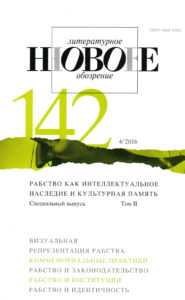 Memories of slavery continue to influence relationships, institutions, and political and legal practices and identities worldwide. Yet, in Russia, slavery is generally viewed as a historical aberration associated only with eighteenth and nineteenth century America. As the centenary of the 1917 revolution approaches, a double issue of NLO defines slavery as ‘any form of forced labour, oppression or captivity’, including feudal serfdom. ‘Without understanding the consequences of serfdom, it is impossible to explain what occurred after 1917 or what is happening in Russia today’, write the editors.
Memories of slavery continue to influence relationships, institutions, and political and legal practices and identities worldwide. Yet, in Russia, slavery is generally viewed as a historical aberration associated only with eighteenth and nineteenth century America. As the centenary of the 1917 revolution approaches, a double issue of NLO defines slavery as ‘any form of forced labour, oppression or captivity’, including feudal serfdom. ‘Without understanding the consequences of serfdom, it is impossible to explain what occurred after 1917 or what is happening in Russia today’, write the editors.
Masters and slaves: Mikhail Yampolski argues that the Russian experience of slavery was radically different from that of other cultures, because the country’s own population was held in bondage. Operating a Hegelian frame of reference, Yampolski argues that in Russia nobles and serfs never perceived themselves as fully ‘other’ or separate; what Gilbert Simondon called ‘individuation’ was never reinforced. ‘Internally directed enslavement destroys the foundations of differentiation and individuation and creates the master-slave complex from which Russian civilization suffers so acutely.’
Peasants and gentry: Tomasz Zarycki sees the discussion on the legacy of serfdom in Poland as a standoff between liberals and radicals. Liberal intellectuals argue that the landowning elites of the Polish–Lithuanian Commonwealth are idealized through association with the myth of the Rzeczpospolita, hailed by conservatives as the perfect national republic. Radical thinkers, on the other hand, see the Commonwealth in terms of exploitation and oppression. Even today, the status of peasant farmers remains very low, while that of the gentry and their descendants is the opposite. ‘The gentry are an imagined category, not an existing group which can be blamed or credited for the current state of Polish society’, remarks Zarycki.
Memory and museums: Anke Giesen, Andrei Zavadsky and Artem Kravchenko examine three exhibitions in Russian museums devoted to the Gulag and Soviet repressions after Stalin. In all cases, ‘images of slavery have been replaced by images of collective “socialist labour”’. People in captivity are increasingly presented as performing heroic and productive work ‘for the good of the nation’, in terms very reminiscent of the Soviet period.
More articles from NLO in Eurozine; NLO‘s website
Osteuropa (Germany) 8-10/2016
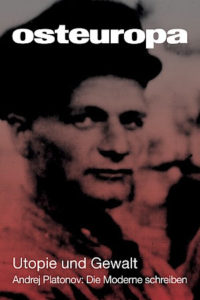 Back in 1973, Joseph Brodsky called Russian author Andrei Platonov one of the most important writers of the twentieth century, alongside Kafka, Musil and Joyce. That is meanwhile the view of literary criticism internationally. However, Platonov’s writing from the 1920s and 30s took a long time to be received in the West, while in Russia it appeared only during perestroika. Today, Platonov is more or less unknown in his country of birth.
Back in 1973, Joseph Brodsky called Russian author Andrei Platonov one of the most important writers of the twentieth century, alongside Kafka, Musil and Joyce. That is meanwhile the view of literary criticism internationally. However, Platonov’s writing from the 1920s and 30s took a long time to be received in the West, while in Russia it appeared only during perestroika. Today, Platonov is more or less unknown in his country of birth.
To coincide with the appearance at the end of last year of an acclaimed new German translation of The Foundation Pit (1930), Platonov’s allegorical novel about the destruction of village life by collectivization, Osteuropa has published a monumental issue collecting not only secondary literature but also first-time translations of Platonov’s journalism and reflections on the author by leading eastern European writers.
They include the Ukrainian poet Serhij Zhadan, who sums up Platonov’s violent, absurdist and deeply unsettling prose as such: ‘Platonov did to language what the Bolsheviks, to put it crudely, did to Marxism: he took the theoretical material and simply smashed it up, turned it inside out, unscrewed the joints between words and sentences, robbed theory of its original meaning, robbed it of meaning altogether. The same thing happens to Marxism in the hands of Platonov’s characters. Utopia loses its sense in the process of realization and assumes another, evil, cruel tone, which wipes out all those involved in it, who risk contact with it, who take hold of it, who believe in it.’
Also in the issue: Historian Stephan Merl on Stalinist collectivization: during the early 1930s, the slaughtering of livestock and the collapse of the grain industry caused a famine which brought over six million casualties. Literary scholar Robert Hodel on visions of happiness in The Foundation Pit: the novel undermines the utopian teleology of happiness while suggesting a Christian-humanist alternative. And Platonov’s translator Gabriele Leupold on rendering Platonov’s ‘beautiful’ but ‘wrong’ language.
More articles from Osteuropa in Eurozine; Osteuropa’s website
The Eurozine Review presents a selection of the latest issues of Eurozine partner journals, summarizing their contents in English as a way of encouraging cultural and political dialogue between national public spheres in Europe.
Published 10 April 2017
Original in English
First published by Eurozine
© Eurozine
PDF/PRINTNewsletter
Subscribe to know what’s worth thinking about.

